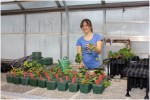In September 2011, Megan McKenzie, a sophomore high school student, joined Jennifer Lau’s lab at the Kellogg Biological Station (KBS) Long Term Ecological Research (LTER) site. Working with graduate student mentors, Elizabeth Schultheis and Tomomi Suwa, McKenzie designed and implemented a project addressing the effects of the invasive plant garlic mustard on native plant species in Michigan. Garlic mustard is a prolific invader, outcompeting native species and changing plant communities in the forest understory. Her project addresses one of the ways that garlic mustard may invade - by killing off the ‘mutualist’ partners of native plants.
Mutualisms are a special type of relationship in nature where two species both benefit from the association. Plant species typically perform best when their mutualist partner is present in the soil. In leguminous plants, mutualist bacteria (rhizobia) live in small root bumps, called nodules, and receive protection and food (photosynthetic carbon) from the plant. In return, the rhizobia fix nitrogen for the plant, which plants need to build proteins and DNA. Lau’s lab hypothesizes that garlic mustard may outcompete native species indirectly, by killing rhizobia with chemicals they release into the soil. To explore this hypothesis, McKenzie is conducting a greenhouse experiment where she is manipulating the presence and absence of rhizobia and garlic mustard. She predicts that native plants will grow best in presence of rhizobia but in absence of garlic mustard and its chemicals.
By the end of April 2012, McKenzie will have been exposed to a wide range of research areas, including community ecology, invasion biology, and evolution. In addition to participation in ongoing research projects, she is enjoying the opportunity to experience the full scientific method, from hypothesis formulation to data collection and interpretation.
McKenzie’s mentors, Schultheis and Suwa, are Fellows in the GK-12 partnership at KBS and have encouraged her to develop classroom materials related to her research that can be used in Michigan schools. After collecting data on her project, McKenzie plans to share her findings with researchers, teachers, and fellow students at the Battle Creek Central High School and the Battle Creek Area Mathematics and Science Center. She plans to pursue an education in science, and her time at KBS has provided a good link to the scientific community and future research opportunities.
McKenzie’s study is funded under Research Assistantships for High School Students (RHASS) from the National Science Foundation (NSF), which is aimed at broadening the participation of high school students in the study of biological sciences.

 Enlarge this image
Enlarge this image